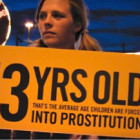
Victim of Sex Trafficking in U.S. Tells Her Story
|
Laura had turned her first trick on February 1, 2000, for a pimp named Quinn.
Juvenile Justice Information Exchange (https://jjie.org/tag/sex-trafficking/page/2/)

Laura had turned her first trick on February 1, 2000, for a pimp named Quinn.

We sat in court and Raquel doodled butterflies and rainbows and wrote a poem about feeling lost. I scribbled down our next court date and told her I would meet her in the lock-up when the court officers led her away. She was my first young client charged with prostitution. Sitting beside me with long fake nails and extensions in her hair, she looked older than her age of 14, but not much. The idea that our justice system charges young girls like Raquel with prostitution, and sometimes locks them up — she spent one year in detention — shocked my friends and relatives who were frequently surprised about the realities of the juvenile justice system when I shared moments from my work.

This story was produced by New America Media and The San Francisco Public Press.
On the 900-mile trek of mostly desert that stretches between Eritrea and Egypt, hunting for humans has become routine. Eritrean refugees who have fled their homeland fall prey to Bedouin or Egyptian traffickers. The refugees are held for ransom. Those with relatives abroad who can pay for their release might survive. Those who do not are often killed.

Teachers can be the first line of defense against child sex trafficking, according to Maria Velikonja, a former FBI agent who has worked on human trafficking issues for the United Nations. During a two-day conference on sex trafficking at Georgia State University, in Atlanta, Velikonja spoke about the warning signs educators should watch for in their students and what teachers can do to keep their students safe. The conference, Not in Georgia: Combating Human Sex Trafficking, organized by the Georgia Department of Education, was the third part of an ongoing series of lectures on the sex trade. In a lecture titled, “Combating Human Sex Trafficking in Georgia: What Public School Educators Can Do,” Velikonja began by outlining some of the basics of sex trafficking for teachers. “What does a potential sex trafficking victim look like?” she asked the small crowd.

As the nation gears up for this year’s Super Bowl in Indianapolis, law enforcement officials there are getting ready for the influx of children and their captors who make up a large part of the sex trade industry. This business always gets a boost from the “anything goes” atmosphere of the Super Bowl. Last year authorities made nearly 60 prostitution arrests during the time around the game, 11 of which were believed to have involved human trafficking. This uptick in activity is only a symptom of a huge problem, both here in the United States and around the globe. Worldwide, the U.S. State Department estimates that 800,000 people, roughly equal to the population of San Francisco, are trafficked across international borders, about 17,500 of which are brought into the United States. Total revenues of the trade worldwide are estimated by UNICEF to be around $12 billion dollars.

Most states aren’t doing enough to curb child sex trafficking according to a new report by the advocacy group Shared Hope International. The study, prepared in partnership with the American Center for Law and Justice, graded all 50 states on the strength of their sex trafficking laws. States that protected minors and prosecuted traffickers received the highest grades. But more than half of states received grades of D or F.
Leading the states with grades of B were Texas, Missouri, Illinois and Washington. All received high marks for criminal provisions addressing demand and protective provisions for child victims.
Georgia ranked near the top as one of only six states receiving a C because of its comprehensive human trafficking law and laws combating commercial exploitation of children.

The Internet, like all tools, can be used for good or bad. Human trafficking, a form of modern day slavery that often involves forcing people, including children, to have sex for money, is part of the dark side. It’s well-known that traffickers get online to exploit victims and advertise their services through social media and classified sites. But what if the Internet were used against these traffickers? A year-long investigation into technology and human trafficking showed that online traffickers leave behind a trail, which can be followed by investigators working to combat human trafficking.

The Women’s Foundation of Minnesota recently launched a combination of grants, research, public education, convening and evaluation to end sex trafficking of girls. Among the grants, the A FUTURE: Minnesota Girls Are Not for Sale campaign.
NEW YORK --There are advantages and difficulties, including legal barriers, to converting prostitution charges into an opportunity to provide services to girls on the street. That was the conclusion of a panel of experts assembled at the 74th annual conference of the National Association of Juvenile and Family Court Judges recently. “There is a conflict in our law,” suggested Judge Edwina Richardson-Mendelson, administrative judge of the city’s family courts, “How can we criminally prosecute kids for prostitution when the law says that they can’t legally consent to having sex?” she asked. “Every child arrested is a sexually exploited child.”
The Safe Harbor bill enacted in April 2010 creates a rebuttable presumption that a minor arrested for prostitution in New York is a “trafficked” person, allowing a diversion from delinquency court to a children’s services program. But Judge Richardson-Mendelson pointed out the difficulties associated with the Safe Harbor Bill.

Read up:
Governor Deal (GA) signs Human Trafficking bill into law:
http://bit.ly/k5dzBP
OJJDP census of kids on probation:
http://bit.ly/kidsonprobi
CDC teen pregnancy stats 1991-2009 [infographic]:
http://bit.ly/preginfo
Justice Department report sheds light on human trafficking stats:
http://bit.ly/traffstats
Youth Justice Barbecue celebrates year of progress:
http://bit.ly/voxbbq
Host: Ryan Schill
Video: Clay Duda